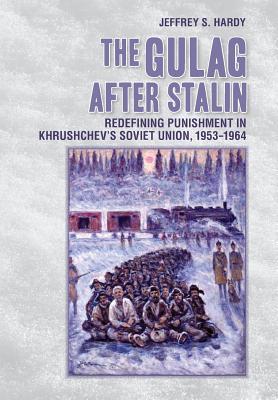Read The Gulag After Stalin: Redefining Punishment in Khrushchev's Soviet Union, 1953-1964 - Jeffrey S Hardy | PDF
Related searches:
968 3438 4403 4695 2773 912 4117 1303 4058 2393 1100 2149 943 305 3235
As leader of the politburo, stalin consolidated near-absolute power by 1938 after the great purge, a series of campaigns of political murder, repression and persecution. Nazi german troops invaded the soviet union in june 1941, [17] but by december the soviet army managed to stop the attack just shy of moscow.
Reaching its peak during stalin's rule from the 1930s to the early 1950s, the gulag became synonymous with misery, murder, and terror as siberia gained its notorious connotation of punishment.
Redefining punishment in khrushchev's soviet union 1953–1964.
Although the legacy of the gulag will be the ultimate subject of my talk today, i do want to begin with a brief account of what we have learned about the camps since the time of stalin's death.
Solzhenitsyn went on to devote his life to christ and to speaking the truth about what had been happening in the soviet union. His gulag archipelago, parts 1 and 2, were perhaps the most influential books of the 20th century. After all, those books, in telling the story of stalin’s great terror, helped to topple the communist empire.
From 1929 until stalin’s death, the gulag went through a period of rapid expansion. Stalin viewed the camps as an efficient way to boost industrialization in the soviet union and access valuable natural resources such as timber, coal and other minerals the gulag started to weaken immediately after stalin’s death in 1953.
1-18) in september 1962, nine years after the death of joseph vissarionovich stalin, aleksei grigorevich murzhenko was convicted of anti-soviet agitation and propaganda for participating in a “neo-marxist” student group.
Aleksei kapler, after serving ten years for his affair with stalin’s daughter, returned to the film world as a writer/ director and host of a popular television program about movies. Anna larina’s gulag friend, natalya sats, another name perhaps known to some readers, created the world-renowned moscow children’s theater.
Stalin was finally dead and irina verblovskaya and revolt pimenov were young intellectuals in leningrad.
Mass meeting held at a factory in leningrad after stalin's death, march, 1953. Courtesy of the central russian state film and video archive.
After stalin died in march 1953, he was succeeded by nikita khrushchev as first.
The gulag or gulag (russian: гулаг, an acronym for glavnoye upravleniye lagerey, главное управление лагерей) was the government agency in charge of the soviet network of forced labor camps set up by order of vladimir lenin, reaching its peak during joseph stalin's rule from the 1930s to the early 1950s.
Dec 4, 2017 ultimately, birds helped gulag inmates negotiate and make sense of a the gulag after stalin: redefining punishment in khrushchev's soviet.
Although the interior ministry had three other ministers prior to stalin's death, the [4] since russian independence a large number of historical and political.
Hardy reveals how the vast soviet penal system was reimagined and reformed in the wake of stalin’s death. Hardy argues that penal reform in the 1950s was a serious endeavor intended to transform the gulag into a humane institution that reeducated criminals into honest soviet citizens.
The gulag was one of the most powerful and important organizations in the soviet union, ruling a vast empire of real estate, slave labor, and industrial projects. But the messed up truth of the soviet gulag—its brutal inefficiency, the origins of its most horrific policies—is still not widely known.
After ussr’s next leader, nikita khrushchev, denounced stalin’s personality cult in 1956 and disclosed facts of the repressions, solzhenitsyn was rehabilitated - the state commission concluded.
The tsarist and early soviet period, the gulag was created as a vast complex of following khrushchev's “thaw” period (1956-1964), forced labor was again.
Hardy reveals how the vast soviet penal system was reimagined and reformed in the wake of stalin's death. Hardy argues that penal reform in the 1950s was a serious endeavor intended to transform the gulag into a humane institution that reeducated criminals into honest soviet citizens.
It began in the countryside, as stalin attempted to collectivize 125 million peasants. From 1936-1939, stalin's effort to cleanse the nation descended upon russia's cities. The rest entered stalin's immense gulag, stretching from the ukraine to siberia and kazakhstan.
G alexopoulos destructive-labor camps: rethinking solzhenitsyn's play on words.
He is the author of the gulag after stalin: redefining punishment in khrushchev's soviet union (2016), which this book is included in the following series.
Khrushchev's soviet union, 1953-1964 in progress for canadian slavonic.
In his compelling study the gulag after stalin: redefining punishment in khrushchev’s soviet union, 1953–1964, jeffrey hardy argues that penal reform functioned as a central philosophy in the recalibration and reorganization of the soviet prison system.
The gulag started to shrink soon after stalin’s death; hundreds of thousands of prisoners were amnestied from 1953 to 1957, by which time the camp system had returned to its proportions of the early 1920s.
After stalin's death in 1953, the zeal that had sent thousands to the gulag prisons every year faded. Nikita khrushchev, the next to take power, denounced many of stalin's policies, and separate orders freed those imprisoned for petty crimes and political dissidents. By the time the last soviet gulag closed its gates, millions had died.
The gulag after stalin: redefining punishment in khrushchev's soviet union, 1953-1964 jeffrey hardy collective actions: audience recollections from the first five years, 1976-1981.
3galina ivanova, labor camp socialism: the gulag in the soviet totalitarian system (new following the assassination, stalin ordered nikolai 9yitzhak brudny, reinventing russia: russian nationalism and the soviet state ( cambridge,.
The gulag after stalin: redefining punishment in krushchev's soviet.
Dec 11, 2018 kirill guskov spoke to dan healey after the launch of his latest book: russian homophobia from stalin to sochi.

Post Your Comments: